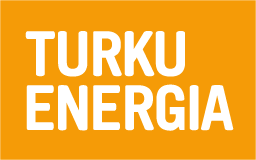Business review
2022: a Challenging Year for the Energy Market
The Russian war of aggression in Ukraine that began in 2022 and the resulting energy crisis posed challenges to the operations of Turku Energia and to the functioning of the society as a whole. Due to the unusual behaviour of the electricity and energy market throughout the year, Turku Energia's results decreased significantly from the previous years. Yet despite the challenging global situation, Turku Energia continued to make determined progress towards carbon neutrality and was able to reduce, for example, the specific emissions of district heating. The security of electricity and heat supply also stayed at a very good level.
TURNOVER
458,1
M Eur
INVESTMENTS
23,5
M Eur
OPERATING PROFIT
1,9
M Eur

7 min 26 s
DURATION OF
ELECTRICITY OUTAGE

328
EMPLOYEES

20,0 M eur
DIVIDENDS
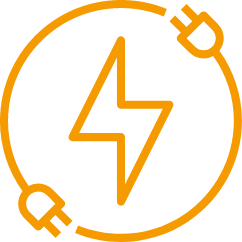
100 146
ELECTRICITY
ACCOUNTING POINTS

99,99 %
CONTINUITY OF
HEAT SUPPLY

200 000
END CUSTOMERS OF
DISTRICT HEATING

78 %
OF THE DISTRICT HEATING PRODUCED
WITH RENEWABLE ENERGY

75 %
LOWER CO2-EMISSIONS
COMPARED TO 2017

132
END CUSTOMERS OF
DISTRICT COOLING
The unstable global situation and energy crisis were reflected in Turku Energia’s results, which decreased significantly from the previous years. Turku Energia Group’s turnover improved, reaching EUR 458.1 million (2021: EUR 333.2 million). Operating profit was EUR 1.9 million (2021: EUR 22.4 million). The Group’s investments totalled EUR 23.5 million (EUR 23.0 million). The investments mainly concentrated on improving and maintaining the transmission capacity and operating reliability of the networks.
The results of district heating were lower than predicted due to e.g. the warmer-than-usual winter, significantly increased production costs and the write-down of an instalment of approximately EUR 4 million recorded as network investments in district heating rental networks since 2012. The results of electricity sales were also heavily negative. On the other hand, Turku Energia's electricity generation affiliates yielded positive results, which together with the high wholesale prices of electricity contributed to the growth of turnover. The rise in the price of electricity led to increased electricity generation, which yielded a profitable result after several unprofitable years. Turku Energia Sähköverkot achieved a good result.
The significant decrease compared to the previous year was also affected by the write-down of the investment of EUR 20 million made in the Fennovoima project between 2007 and 2022, as Fennovoima terminated their contract on plant delivery for Hanhikivi 1 nuclear power plant with Russian Rosatom in May. Turku Energia's share of Fennovoima’s majority shareholder, Voimayhtiö SF, is 3.79 per cent.
The year 2022 for business units
Energy Solutions: In the turbulent electricity market, responsibility and energy efficiency appealed to customers
The Energy Solutions unit provides consumers and corporate customers with electricity products, solar panels and electric vehicle charging solutions. It also offers businesses and housing companies a service package for energy management and responsibility reporting. The goal is to provide a comprehensive service for both consumers and corporate customers.
The behaviour of the electricity market was exceptional and unpredictable throughout 2022. The Russian war of aggression caused a Europe-wide price risk, leading to an explosive rise in the price of electricity. In the turbulent electricity market, Turku Energia along with the entire sector had to restrict the sales of fixed-term electricity contracts in the autumn of 2022. Due to these circumstances, many customers decided to switch to exchange electricity contracts.
Customer numbers continued to grow on both the consumer and corporate sectors also during 2022. The demand for solar panels increased significantly. Customers were interested in investing in small-scale production and renewable energy, especially as the price of electricity shortened the solar panel payback period. With the growing number of hybrid and electric cars in traffic, there was also continuous demand for electric vehicle charging solutions.
Customers were kept informed about the changing circumstances of the entire energy sector through various communication channels. In addition to the topics of energy efficiency and saving, the communication centred on increasing public awareness about the changes in the electricity market and pricing brought about by the energy crisis. The Energy Solutions unit is also responsible for the Group's customer service operations, and customer service congestion was alleviated with efficient communication. After the coronavirus pandemic, the customer service point was reopened at the new premises on Teollisuuskatu.
Corporate customers and housing companies were particularly interested in topics of responsibility and energy saving. Introduced to the customers towards the end of 2021, Turku Energia’s new energy management and responsibility reporting service Enerkey continued to attract interest among the customers.

2022 was an extraordinary year, with energy prices rising after Russia started war on Ukraine. The electricity market did not treat people or companies equally, as some of the fixed-term contracts ended at the time electricity prices peaked. Customers started saving energy, and interest in solar panels increased significantly.
Harri Salo, sales director, energy solutions
Turku Energia Sähköverkot: Record few power cuts
In 2022, Turku Energia Sähköverkot Oy transferred 1,548 GWh of electricity to customers in its own network area (2021: 1,573 GWh) and 472 GWh (513 GWh) to other system operators . The amount of electricity transferred to customers was slightly lower than in 2021. The decreased transfer volume is explained by the energy savings generated by the ongoing energy crisis and the year’s milder than usual weather.
New accounting points totalled 591 and, at the end of the year, the accounting points amounted to a total of 100,146. The quality of electricity supply remained on an excellent level. Last year, the average interruption time of electricity supply per accounting point fell to a record low of 7 minutes, 26 seconds, with the previous record dating from 2017. Most of our customers did not experience power cuts at all.
War in Europe and the exceptional situation on the energy market increased uncertainties related to the supply of electricity in 2022. Along with the other electricity transmission companies, Turku Energia Sähköverkot prepared for the potential shortages of electricity in autumn 2022 by, for example, verifying and reviewing their own operating procedures, readiness and communications related to shortage of electricity. Customers and other stakeholders were actively informed about preparing for power cuts.
Turku Energia Sähköverkot Oy’s transmission prices continue to be among the lowest in a nationwide comparison. Transmission prices were lowered in April 2022.
Investments were concentrated on improving and maintaining the transmission capacity and security of supply of the electricity network. The investments totalled EUR 10.3 million (EUR 10.8 million). The majority of the investments focused on regional renovations where, for example, overhead lines were replaced by ground cabling.
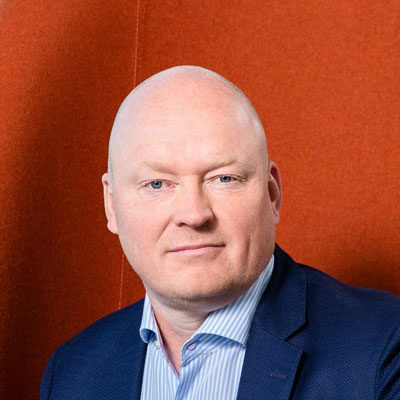
The energy crisis was also reflected in electricity transmission, as the high price of electricity and the threat of shortages intensified energy saving measures. Shortages were avoided, but extensive preparations were made through proactive measures and increased communication. Our transmission prices continued to be among the lowest in a nationwide comparison.
Tomi Toivonen, managing director, Turku Energia Sähköverkot Oy
Heat: Specific emissions of district heating continued to reduce
The sales volume of district heating decreased from the previous year to 1,883 GWh (2021: 2,039 GWh). The delivery volumes of district cooling were slightly smaller than in the previous year. Delivery volumes for steam stayed at the level of the previous year.
The sales volume of district heating was affected by the warmer-than-usual year and the measures taken by customers to save heating energy. These factors, as well as the changes in fuel prices and availability caused by the energy crisis, contributed to the fact that the result of the Heat business unit was not in line with the budget. The price of district heating, which has been on the decrease in recent years, also had to be increased due to the energy crisis and high production costs.
The year was good with regard to new customers. The fast pace of construction in the Turku area is also reflected in the number of people connecting to the district heating systems. In 2022, an exceptionally large number of new customers connected to district heating.
Despite the challenging year, the share of renewable energy sources in district heating procurement increased slightly to 7 8% from the 75 % in 2021. District heating was mostly produced with renewable bioenergy, heat pumps and waste heat. Some coal, oil, SRF fuel, peat and asphaltene were also used in the production.
The specific emissions of district heating sold by Turku Energia decreased by 14 per cent compared to the previous year. The specific emissions of district heating were 60 kgCO2 per MWh of energy sold. The decrease in specific emissions was due to factors such as reduced oil consumption in district heating production. Network losses in district heating have decreased year by year and production is being continuously optimised, which has enabled us to lower the temperature of water in the network.
The security of supply to customers of Turku Energia’s heating and cooling remained at an extremely high level, at almost 100 per cent Determined investments have been made in the maintenance of the district heating network, and the results can be seen in the security of supply to customers.
At the end of the year, Turku Energia announced its investment in a flue gas scrubber for the Artukainen steam generation plant. The new equipment will improve the plant's efficiency and further reduce the CO2 emissions of district heating. The scrubber will be put into service in summer 2023.
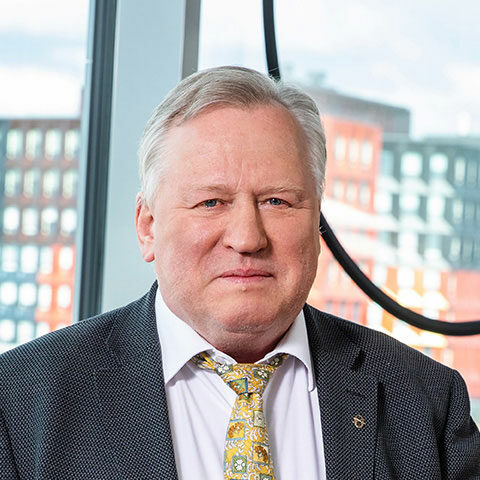
Despite a difficult year, the security of supply of critical products was at an extremely high level. On the other hand, financial targets were not met due to increased production costs. Our journey towards carbon-neutral energy production continued and we were able to lower the specific emissions of district heating from the previous year.
Jari Kuivanen, director, heat
Network Engineering: Financial targets met and occupational safety improved
The Network Engineering business unit produces the majority of Turku Energia Sähköverkot Oy's network construction, installation and maintenance services. In addition, the Network Engineering unit is responsible for installing some of the products sold by the Energy Solutions unit. The City of Turku is also a major client of the Network Engineering unit.
Network Engineering plays a key role in maintaining the security of supply of Turku Energia Sähköverkot Oy. In 2022, the largest projects were related to regional renovations of the electricity network. In addition, the lighting project on the Turku Ring Road was completed, electrical maintenance was performed on heating stations and electric vehicle charging solutions were built in order to meet the high demand.
Like other business units, the Network Engineering unit moved to the new premises on Teollisuuskatu in Turku in the spring. Thanks to the new facilities, it was possible to develop and bring together warehouse services and thus serve other business operations better and more efficiently.
Special lighting destinations also fall within the competence area of Network Engineering. The Big Blue façade artwork lighting project in the former Hartwall brewery building Piispantorni continued in 2022. The lighting was designed by Design Manager Antti Viertamo in co-operation with visual artist Mauri Kosonen. The artwork won the 2022 Glass Building of the Year award of the Suomen Tasolasiyhdistys association.
The year was excellent in terms of occupational safety, with only two occupational accidents occurring. This is a record-breaking figure over a 10-year observation period.

Last year, we achieved good results and met our financial targets. Moving to the new premises went well and enabled us to develop our operations. We also celebrated an excellent year of occupational safety. Our investments in occupational safety are paying off.
Harri Salminen, director, network engineering
Production Services: Reliable electricity and heat production
The Production Services business unit produces operational and maintenance services for our affiliated company Turun Seudun Energiantuotanto Oy and to Turku Energia’s Heat unit. The operational targets set for 2022 were largely met. The availability of networks and generation plants operated by the unit remained at a good level. The Russian war of aggression in Ukraine and the resulting energy crisis caused the electricity market to behave in an exceptional and unpredictable manner, which affected the practical operation of the generation plants and maintenance of the critical operations related to security of supply.
The focus of the work of the Production Services unit is on ensuring the reliability and security of supply of electricity, heating, cooling and steam. During 2022, the Production Services unit developed e.g. control room functions through reforming automation systems and facilities, aiming at further developing security of supply over the long term.
The importance of occupational safety is highlighted in operational and maintenance work. Investments in the systematic development of occupational safety continued. The Production Services unit supported the transition towards carbon neutrality through projects related to recycled fuels and heat pump technology, which will further reduce the carbon footprint of production in the Turku economic area in the years to come.
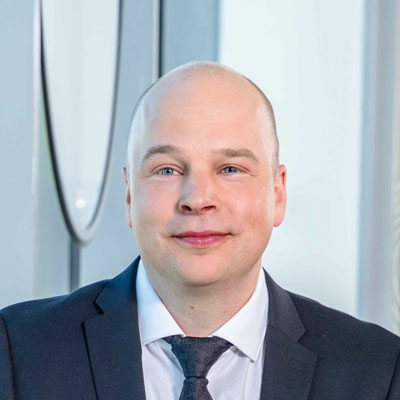
The Production Services unit supported the transition towards carbon neutrality through projects related to recycled fuels and heat pump technology, which will further reduce the carbon footprint of production in the Turku economic area in the years to come.
Juho Perkonoja, director, production services
